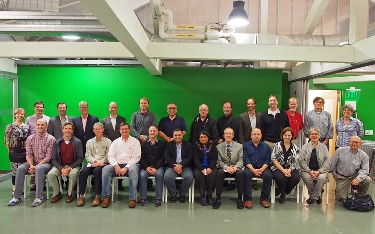NEWS
Interdisciplinary faculty team selected for NSF Pathways to Innovation Program
A team of Louisiana Tech University faculty and administrators has been selected by the National Science Foundation’s (NSF) National Center for Engineering Pathways to Innovation (Epicenter) as one of only 14 university teams to join the Pathways to Innovation Program in 2016.
Dr. Kelly Crittenden, associate professor of mechanical engineering and nanosystems engineering, and Kyle Prather, director of the Louisiana Tech Thingery, will lead the Louisiana Tech Pathways group.
The interdisciplinary team, a compilation of faculty and staff from Louisiana Tech’s College of Engineering and Science and the College of Business, will participate in the third cohort of Epicenter’s national Pathways to Innovation Program, which helps institutions to fully incorporate innovation and entrepreneurship into undergraduate engineering education.
Primary team members include Dr. Hisham Hegab, dean of the College of Engineering and Science; Dr. Heath Tims, associate dean of undergraduate studies for the College of Engineering and Science; Dr. David Hall, director of mechanical engineering, civil engineering and construction engineering technology; Dr. Katie Evans, director of mathematics and statistics and industrial engineering; Dr. Galen Turner, director of computer science, cyber engineering, electrical engineering and electrical engineering technology; Dr. Dave Norris, director of Louisiana Tech’s Enterprise Center and chief innovation officer; and Debbie Inman, coordinator of entrepreneurial studies for the College of Business.
The program is run by Epicenter, which is funded by the National Science Foundation and directed by Stanford University and the VentureWell. Faculty and administrators participating in the Pathways program are taking on this challenge and leading their universities into a new era of engineering education that prepares students to tackle big problems and thrive in this ever-changing economy.
“Today, engineering and computer science students are expected to enter industry with technical knowledge as well as a diverse set of mindsets, skillsets and attitudes that help them innovate, collaborate and create value,” said Tom Byers, director and co-principal investigator of Epicenter and professor at Stanford University. “As educators, we need to better prepare this generation of students for the workforce, position them for success in their careers, and give them more opportunities to bring their innovative ideas to life.”
“We already strive to instill a ‘can-do-spirit’ in our Louisiana Tech engineering students,” added Crittenden. “Through this Pathways to Innovation partnership, we are looking to expand that mindset to include innovation and entrepreneurship alongside our students’ technical knowledge. We will spend the next several months examining our existing landscape, identifying opportunities for growth, and implementing new strategies to transform our undergraduate engineering experience.”
In addition to the Louisiana Tech team, teams from Binghamton University – SUNY, California State University-Northridge, The City College of New York – CUNY, Florida A&M University/Florida State University, Grand Valley State University, Portland State University, South Dakota School of Mines and Technology, South Dakota State University, University of New Hampshire, University of North Alabama, University of South Florida, Western Carolina University, and Western Kentucky University were selected for the 2016 Pathways to Innovation Program.
Participating schools assemble a team of faculty and academic leaders to assess their institution’s current offerings, design a unique strategy for change, and lead their peers in a transformation process to broaden and strengthen their campus-based innovation and entrepreneurial ecosystems. Program teams receive access to models for integrating entrepreneurship into engineering curriculum, custom online resources, networking opportunities, guidance from a community of engineering and entrepreneurship faculty, and membership in a national network of schools with similar goals.
The teams in the 2016 cohort join a community of 36 institutional teams that are currently participating in the program. The projects include innovation certificates and majors, maker and flexible learning spaces, first-year and capstone courses, faculty fellows programs, and innovation centers. Additionally, several cross-institutional collaborations have resulted from the first group of schools.
“Our two cohorts of Pathways schools have made a tremendous and lasting impact on the education of their students,” said Victoria Matthew, the Pathways program leader and senior program officer at VentureWell. “We are thrilled to welcome these 14 new teams to our national community so we can continue to work together on transforming engineering education.”
Written by Brandy McKnight – mcknight@latech.edu
